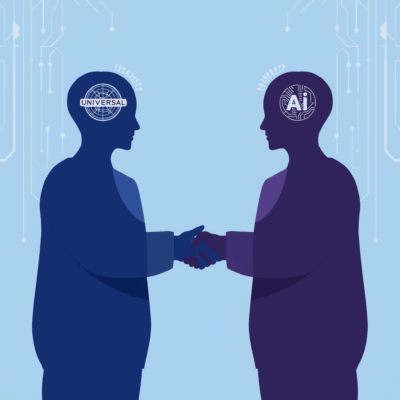Universal Music and Udio: When AI Challenges Performing Artists’ Rights
 Temps de lecture/Reading time : 2 minutes
Temps de lecture/Reading time : 2 minutes
On October 29, 2025, Universal Music Group (UMG) announced a groundbreaking agreement with Udio, a company specialized in AI-generated music. The deal comes after a legal dispute over Udio’s alleged use of UMG’s protected recordings to train its AI models.
The partnership will see the launch of a “licensed” AI music platform in 2026, using authorized and filtered content. Universal presents the agreement as an opportunity for additional revenue for artists and as a technological advancement within a legal and controlled framework. But the implications for performing artists are far from trivial.
Legal and Technical Context
UMG initially sued Udio for copyright infringement, accusing the startup of using its recordings without permission for AI training. The settlement ends the dispute while granting Udio the right to use certain works under license.
According to official statements, the Udio platform will operate as a “walled garden,” with content filtering and digital watermarking to prevent unauthorized use. The stated goal is to create an environment where AI and human creativity coexist, with compensation for artists and songwriters whose works are used to train the models.
Implications for Performing Artists
The rise of AI in music creation raises several questions for performing artists:
- Opportunities and Revenue: Universal claims that affiliated artists may receive additional income from the AI’s use of their recordings.
- Risks and Dilution of Value: There are concerns that AI could directly compete with human performers, replicating their voice or style, and “diluting” the value of the original performance.
- Control Over the Use of One’s Voice: Neighboring rights have traditionally protected performers. AI raises questions about consent and compensation for derivative or modeled uses.
In short, while AI offers new creative possibilities, it also introduces significant risks to performers’ recognition and protection.
Response from French Organizations: SPEDIDAM and ADAMI
In France, SPEDIDAM and ADAMI, two collective management organizations representing performing artists, have strongly opposed the deal:
- They emphasize that performers’ rights must be respected and that their voices should not be used to train AI without permission and compensation.
- In 2025, both organizations exercised their legal “opt-out,” refusing to allow their members’ recordings to be used in AI training datasets.
This opposition highlights a fundamental conflict between UMG’s commercial and technological ambitions and the protection of performers’ rights.
The agreement raises several questions about the future of the music industry in the age of AI:
- What legal limits will exist for the use of performers’ recordings?
- How will transparency and control over works used for AI be ensured?
- Will the value of human performance be affected by the proliferation of AI-generated music?
- What role will collective management organizations and national or international regulations play in shaping this new model?
The Universal Music–Udio agreement marks a major milestone in integrating artificial intelligence into music. It opens up new economic and creative opportunities but also raises legitimate concerns about the rights and place of performing artists.
Time will tell whether this collaboration between licensed AI and music will successfully balance technological innovation with the protection of creators—or whether it will usher in a new era in which human performance risks being overshadowed by digital copies.